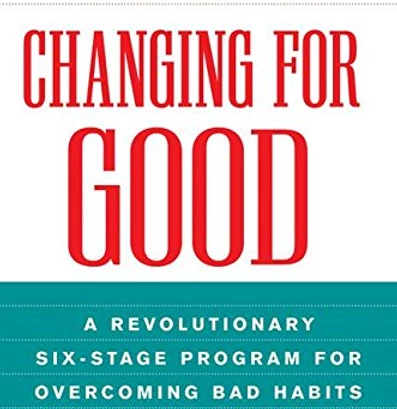
- What are the stages of change?
- Why is change so difficult?
- Why do I keep reverting back to my old way?
- How can I break this cycle?
It has always intrigued me why 45% of folks seeking a therapist for a troublesome phase in their lives drop out after the first couple of visits. I started to dig a bit deeper and was fortunate enough to be given a book called Change for the Good, pictured here. The authors spent a very long period of time researching and studying this topic of change. It is an awesome book and I urge you to read it. Below is a inkling of what the book is about and the documented stages of change. It has help me greatly to understand my clients better and help promote lasting change.
There are 6 stage to change:
The Stages of Change
- Pre-Contemplation
- Contemplation
- Preparation
- Action
- Maintenance
- Termination
Pre-contemplation
It was once said that Pre-Contemplators can’t see the solution because they aren’t aware that there is a problem. Most Pre-Contemplators do not want to change themselves. They want to change everybody around them. I have had a number of these folk come and see me. They normally are sent to me by a family member or friend. They say “how do I get my partner/ mum/ sister off my case?” These guys may do as much as possible until the nagging stops, then they would revert back to their old self. Someone in this stage does not want to change. They do not want to inform themselves about their problem either. These guys are normally in denial. They think that denial (the Nile) is a river in Egypt. Pre-Contemplators are often demoralized because they believe that the situation is hopeless.
Contemplators
In this stage folks acknowledge that they have a problem and do not want it anymore. They struggle to understand the problem and ponder on possible solutions. Contemplators are usually far away from actually taking action. They are just not quite ready yet. It is not unusual for these folks to tell themselves daily that someday that they will change. These people can remain in this stage of contemplation for a very long time, even years. When the contemplator moves towards the Preparation stage then they begin to focus on solutions instead of the problem and they begin to think more about the future than the past.
Preparation
Most folks in this stage are going to take action within the next month. They are over it, had a gut full and are ready to beat this problem. They are making arrangements to change their behaviour or environment. A public announcement now is required. “I am ………… starting next Monday. They need to tell someone about their plans to make themselves accountable, to take responsibility and commit to the process. The information is gathered, the plan is drawn up, and the due date approaches. Folks who skip this stage reduce their chances of success drastically. You may wake up one morning and say “That’s it, no more smoking from today on” If you have only been smoking since yesterday then that shouldn’t be too difficult but if you have been smoking for years than failure is a big possibility. Anxiety and excitement may also increase as the start date approaches.
Action
This stage is where people modify or change their behaviour and or environment. Action may not lead to results immediately. This is why folks need to stay committed and affirm their responsibility to the process. Action may not just be physical though. It can be through raising awareness, changing emotions and self-image. Action may be very significant or slight but as long as something is in process the results will come. In this stage one needs to set small goals along the way to the ultimate goal. Small rewards should be taken after each small goal has been reached. This will increase the motivation, commitment and the probability of ultimate success.
Maintenance
During this stage one must work to consolidate the goal reached and gains attained. The change process never ends with action. This is still a critical stage of the process which may last anywhere from 6 months to a lifetime. Without strong commitment to maintenance one will surely relapse, usually back to the Pre-Contemplation or Contemplation stages.
Termination
This stage is the ultimate goal for all folks wanting to change. Here, one’s former addiction or problem will no longer be a temptation or threat and this behaviour will never return. A person can have complete confidence without fear of a relapse. Of course, some people that have changed never reach this stage. They may stay in the Maintenance stage the rest of their lives.
The Spiral of Change
If only change were that easy. Most people move through the stages of change, then spiral back down to lower stages. They may get to Maintenance, have a relapse, then end up back at the Contemplation or even the Pre-contemplation. Relapses may occur at all stages of the process. Relapse may bring about feeling of failure, embarrassment, shame and guilt. One may feel demoralized and give up on the change process completely. The process can also become circular as one climbs through the stages, falls, starts to climb again, falls etc. But the good news is that each time we fall and get back up, we learn, so that the next cycle will have a higher chance of success.
So how do you know what stage you are in with your problem? Well once you have a rough idea of the action you might take then use the questions below to work it out.
- I solved my problem more than 6 months ago.
- I have taken action on my problem within the last 6 months.
- I am intending on taking action in the next month.
- I am intending on taking action in the next 6 months.
- If you answered No to all questions, then you are in the Pre-Contemplation stage.
Test your Stage
- If you answered Yes to 4 and No to the rest, then you are in Contemplation stage.
- If you answered Yes to 3 and 4 and No to the rest, then you are in the Preparation stage.
- If you answered Yes to 2 and No to 1, then you are in the Action stage.
- If you answered Yes to 1 and no to the rest, then you are in the Maintenance stage.
Of course there is much more to change than this brief article and if you want to know more then by all means read the book.
More reading available below
Feel free to read: Building Self-Confidence , How to Use Positive Affirmations , Create Your Positive Mindset , Detachment , Breath and Ice Therapy , Right or Wrong Decisions , The Power of Meditation , The Stages of Change , Staying Positive with Cancer , Becoming Offended , Stop Seeking Approval , Responsibility , The All Mighty Powerful Ego , Lead & Promote Change , Better Communication , Stress Management , Anger Management & Generalised Anxiety Disorder (GAD)
If you are having trouble with a problem and require help in defining your concern then reach out.
Reach out now
Organise a free up to a 15 minute phone call to see if this service is right for you: 0405 391 110
Or fill out the contact form: https://apspear.com.au/contact/
Check out my social pages:
https://www.facebook.com/MMEI01 or https://www.linkedin.com/in/adrian-p-spear/

